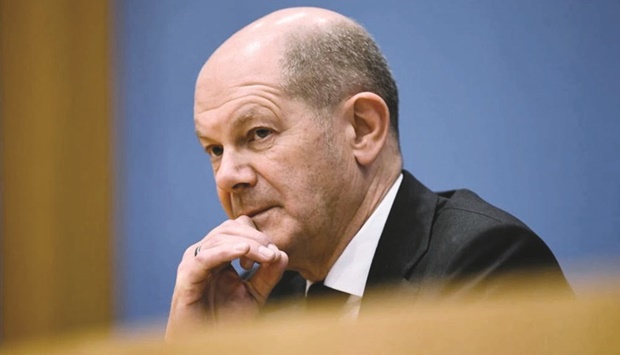After the fall of the Berlin Wall, the newly reunited Germany became a champion and leading exponent of the emerging liberal international order. Germany saw itself, and presented itself to the world, as an economically open democracy with a “welcoming culture” (Willkommenskultur) and a commitment to human rights. Yet while its economic might put it near the top of many international rankings of soft power, decades of underinvestment in the Bundeswehr (armed forces) meant that it punched far below its weight militarily.
Before Russian President Vladimir Putin launched his war on Ukraine, Germany’s foreign policy rested on an ever-deeper European Union, fully integrated transatlantic relations, a belief in Wandel durch Handel (change through trade), international dialogue, and military restraint. But while this approach generally worked well, the military component had become an irritant to allies long before the current war. US presidents since George W Bush have complained about Germany’s low defence spending, and the United States and other EU member states have regarded Germany’s approach as a combination of fence-sitting and free-riding.
Moreover, Germany during this period was turning itself into one of Russia’s and China’s biggest trading partners. As it did business with autocrats around the world, it paid little mind to its growing energy dependency on Russia. From Chancellor Helmut Kohl in the 1990s to Chancellor Olaf Scholz today, German leaders have consistently believed that commerce and dialogue will ultimately bring countries closer together, alleviating the need for hard power.
This naive illusion has now been shattered by one of the greatest failures of German diplomacy since World War II. Years of German-Russian joint ventures and deepening commercial, cultural, and academic relations did nothing to discourage Putin from starting a new war in Europe.
Within days of the Russian invasion, Scholz proclaimed a dramatic policy reorientation. If implemented, it would usher in an epochal shift, making Germany one of the world’s top military spenders and arms exporters. Germany’s economic interests would become much more closely tied to security concerns, and its approach to foreign policy would become more assertive. Europe’s largest economy would also become its largest military power.
But the credibility of Germany’s declared reorientation will depend on whether it has a guiding narrative or strategy, and on who formulates it. Germany’s leadership will need to enlist the support of a generally pacifist electorate, which is by no means assured, given that Scholz announced the paradigm shift without first consulting the Bundestag (parliament) or the broader public.
Nagging questions thus loom large. What will Germany’s new security strategy look like, and what will it cost? Beyond economic costs, such as higher energy prices and more public debt, are social and environmental implications. Will Germans accept reinstatement of conscription or policies making it more difficult to meet decarbonisation targets?
The absence of formal debate on these questions has created a political vacuum and a paralysing sense of helplessness. As Ukrainian President Volodymyr Zelensky explained in his March 17 address to the Bundestag:
“When we asked for preventive sanctions, we turned to Europe, we turned to many states, we turned to you. Sanctions designed to make the aggressor feel you are a force. And we saw a delay. We felt resistance. We understand that you want to continue the ‘economy, economy, economy.’”
Zelensky accused Germany of building a new wall of disingenuous opportunism to benefit itself at the expense of countries like his: “Currently, the trade relations between you and the state which again brought war to Europe are the barbed wire atop the wall…that divides Europe.”
But even after Zelensky’s address – one of the most critical and outspoken speeches ever given by a foreign leader to the Bundestag – there was almost no debate in Germany. The Bundestag merely returned to its regular agenda as if nothing had happened.
This fecklessness must stop, and one way to ensure that it does is to establish a German National Security Council. Long proposed but never realised, an NSC could advance a coherent defence, security, and foreign-policy strategy. Located close to the chancellery, it would act as a central policy co-ordinator, helping to overcome the fragmentation that often characterises federal ministries’ responses to crises. This problem was on full display with the chaotic withdrawal from Afghanistan. But if that failure wasn’t big enough to generate the political will for an NSC, Putin’s war should have provided more than enough impetus.
But the NSC should be more than a coordinating agency, because its task would be decidedly political. It would have to spearhead and manage a debate that the country has long avoided, and its recommendations would have to win broad public support. Given these demands, it should include not only politicians and security experts but also representatives of the business community, civil society, and perhaps even Nato and the EU.
Germany’s future foreign policy must correct for its past failures, particularly its blindness to a world of powerful autocracies. The old model of a benevolent economic and cultural power has proven to be at odds with reality. The new narrative must preserve Germany’s European and transatlantic commitments and avoid dependencies on critical supply chains. Germany needs to be able to fend off hostile external influences, whether Russian cyberattacks or Chinese-financed infrastructure investments. Above all, it must align its economic and security policy with the EU’s common defence strategy. — Project Syndicate
* Helmut K Anheier, Adjunct Professor of Social Welfare at UCLA’s Luskin School of Public Affairs, is Professor of Sociology at the Hertie School of Governance in Berlin.v

RECIPE: From Chancellor Helmut Kohl in the 1990s to Chancellor Olaf Scholz (above) today, German leaders have consistently believed that commerce and dialogue will ultimately bring countries closer together, alleviating the need for hard power.
